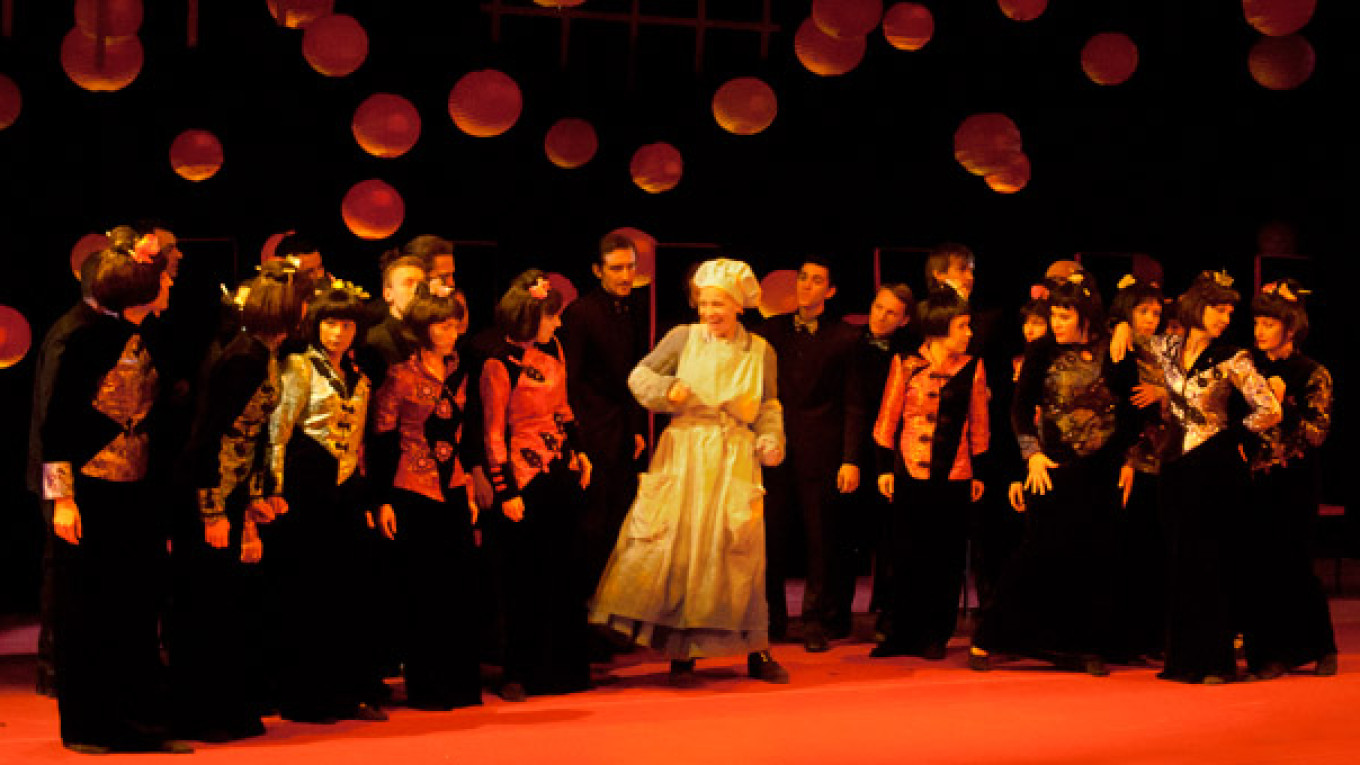An energetic new production of Igor Stravinsky's "The Nightingale" premiered in Moscow last week at the Helikon Opera. Based on a fairy tale by Hans Christian Andersen, "The Nightingale" is the story of a Chinese emperor who becomes besotted with the sweet sounds of a nightingale's song — before allowing the bird to be crudely replaced by a mechanical, jewel-encrusted fake.
"The Nightingale" is a gracious homage to "The Golden Cockerel," a satirical work by Stravinsky's mentor and friend Nikolai Rimsky-Korsakov. Both works contain a subtle streak of pre-revolutionary Russian satire, cleverly sewn into the fabric of a seemingly distant fairy tale. But within months of the first premiere of "The Nightingale" in May 1914, Europe was plunged into the horrors of the first world war — and the intricate imperial vanities of Tsarist Russia, so deftly exposed and satirized in "The Nightingale," were swept away by the October Revolution in 1917.
This is why the Helikon's decision to revive "The Nightingale" is a timely one, nicely marking the centenary of its first production; but it is also perhaps why "The Nightingale" is one of Stravinsky's lesser-known operas, all too often overlooked by producers, the frenetic genius of its composition all too easily forgotten during the fallout surrounding world war one, and its satirical scope no longer pointing in a relevant political direction.
Despite not having the same political bite it once had, the Helikon's stage director Dmitry Bertman believes his production of "The Nightingale" carries an enduring and relevant message about the nature of artistic truth: "The performance is a mirror of what is happening in the world today," he said. "We are all living in an age of replicas and fakes … the nightingale is all about what is real and what is fake. When the emperor prefers the fake nightingale, he is banishing the prospect of creating real art from his kingdom."
As conductor Vladimir Ponkin stirs the orchestra pit to life, and an atmosphere of quivering tension settles over the audience, I consider Dmitry Bertman's remarks: Is replicated art so bad? The curtains rise. An enchanting set of Chinese lanterns and curved wooden rooftops float above the stage. A fisherman (Andrei Palamarchuk) emerges, singing of the nightingale's beauty in a resonant tenor, lighting starlit chairs as he goes — an impressive feat by lighting designer Damir Izmagilov.
The stage is clearly too small, and the acoustics in the theatre are far from ideal — The original Helikon Theatre is under reconstruction, with the company currently performing at a modern performance space on Novy Arbat. Some of the stage movements seem too uncertain, tentative, even quite awkward. The costumes also seem a touch incongruous. The fake nightingale's beautiful shimmering dress, made entirely out of CDs, may well have a powerful message about the false allure of living one's life in thrall to recorded music. But the decision to dress the courtiers in traditional Chinese silks while other characters were dressed in western suits only served to create unnecessary ambiguity.
These faults are, however, entirely forgiven. Lidiya Svetozarova's enchanting, brilliant performance as the Nightingale demands it. Sung in a blissful colorata soprana, her voice has a poignancy, beauty and power that flutters from note to note. And she was accompanied by an assured performance from the Emperor (Alexander Miminoshvili) and an enchanting contralto solo from "Death" (Ksenia Viaznikova).
As the nightingale sings her final song — saving the emperor from Death in the process — a bold, intriguing improvisation of Ghanaian drums plays over Stravinsky's score, and the opera draws to a close after only fifty minutes. A short and fleeting performance, holding to Stravinsky's belief that a story should last no longer than the time it takes to tell it.
The unfortunate part of this story is that in much the same way as the nightingale comes and goes at she pleases, the Helikon's production showed just the one time this season. But there's a fortunate part of the story, too: There are plans for the production to be back in Moscow for the next one, returning to the soon-to-be reopened Helikon Theater. It will certainly be worth the wait.
Contact the author at artsreporter@imedia.ru
A Message from The Moscow Times:
Dear readers,
We are facing unprecedented challenges. Russia's Prosecutor General's Office has designated The Moscow Times as an "undesirable" organization, criminalizing our work and putting our staff at risk of prosecution. This follows our earlier unjust labeling as a "foreign agent."
These actions are direct attempts to silence independent journalism in Russia. The authorities claim our work "discredits the decisions of the Russian leadership." We see things differently: we strive to provide accurate, unbiased reporting on Russia.
We, the journalists of The Moscow Times, refuse to be silenced. But to continue our work, we need your help.
Your support, no matter how small, makes a world of difference. If you can, please support us monthly starting from just $2. It's quick to set up, and every contribution makes a significant impact.
By supporting The Moscow Times, you're defending open, independent journalism in the face of repression. Thank you for standing with us.
Remind me later.


